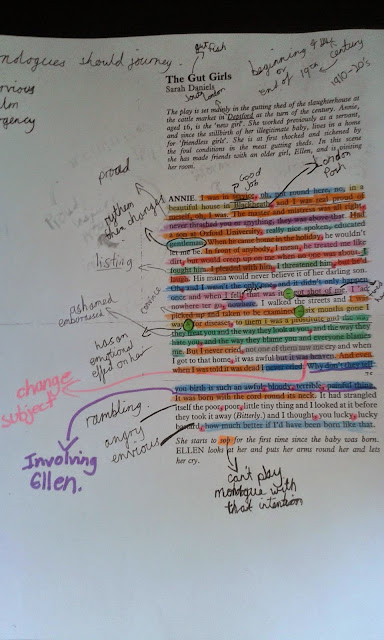Five Kinds Of Silence By Shelagh Stephenson
Plot
It tells the story of a family living under the power of the vicious
Billy, who physically, emotionally, and sexually abuses his wife, Mary,
and children, Susan and Janet. The stage play is adapted from the radio
production of the same name.
Major Themes
Major themes in the play are control and how the family is actually
bonded by abuse. The story of abuse that Billy's family endured unfolds
from interviews with police officials and psychologists with Mary, Susan
and Janet. Billy himself was abused when he was a child; Mary was
abused by her father after the death of her mother. After so many years
the two daughters shoot their father during an epileptic fit.
The play is coordinated to bring out Billy's passively sinister
presence, and although he is not physically there, he is present in
their memories. His abuse to these women has been so horrific that they
shoot him twice to make sure he is dead.
The play also explores ideas of abuse being continued from childhood,
how abused children may in the future abuse their own children and
isolation from the outside world. This theory relates to John Bowlby's
Continuity hypothesis theory. How the relationship an infant has with
its parent or parents shapes future ideas about relationships and future
behaviour towards relationships.
The Play
The stage version of the play was first performed at the Lyric
Hammersmith, London on 31 May 2000. It also won the 1996 Writers' Guild
award for Best original Radio Play and the 1997 Sony Award for Best
Original Drama.
About The Monologue
susan expresses the feelings she has on her father kissing her and her sister in public and the reason her and her sister killed him.
After The End By Dennis Kelly
Plot
A large scale terrorist nuclear attack drives Mark and his work colleague Louise down to Mark's old bomb shelter in his flat.
Monologue brief: They are trapped for a number of days, and Mark told Louise that he
rescues her after a nuclear attack but in reality he had kidnapped her.
Not only did he limit her food rations but raped and tried to kill her.
After she was rescued, Louise visits Mark in prison. Her ordeal has disoriented her and she feels disconnected from her friends, family and work colleagues. Despite her hatred of Mark, he is the only one she can really talk to now.
About The Monologue
he talks about this cat who gradually made her way into her home, they become friendly with eachother. One day the cat scratches her and knows it did wrong. The cat again gradually comes to sit on her lap and Louise strangles the cat until and after it is dead.
Many Moons By Alice Birch
Plot
Tracking the lives of four lonely people across a day in London. Essentially a series of monologues, the play follows the progress of each of
the characters through one day until a heightened, catastrophic collision.
Monologue Brief
It is Juniper's birthday and she wonders if she should invite her neighbour, Oliver, to her party. She dreams of some sort of romantic involvement with him. However, later in the day she discovers him in the local park sexually abusing a small child. This speech occurs at the beginning of the play when we are first introduced to Juniper. She speaks directly to the audience.
About The Monologue
Juniper is decribing the perks of her life and what she's like as a person. Their isn't much of a journey.
Characters
Ollie is nervous, fearsomely intelligent, and finds people more
mysterious than the constellations. The ripely named Juniper Jessop is
an optimistic free spirit "actively looking for love", with the heavens
mapped out on her bedroom ceiling. If only their paths could cross ...
But then there is Meg, heavily pregnant, her mind sharpened to a scalpel
point by disappointment and loneliness. Is Ollie destined to make her
heart beat for the first time in years? And what about Meg's neighbour,
Robert, who likens his wife to a killer whale, and wants his grave stone
to say: "He never did it again"?
Glass Eels By Nell Leysham
Plot
The play is set on the Somerset Levels one August, and tells the story of Lily who is struggling with the first stirrings of her sexuality whilst living in an all male household.
Character
Lily is drawn to the river near her home where her mother is died and where thousands of eels are also stirring. the only person she can make any connection with is a family friend, Kenneth, who has known her all her life
Monologue Brief
It is night and Lily and Kenneth are down by the river, sharing their stories of loss.
About the Monologue
Lily talks about how her dad kept cadavas in the basement and snuck down to look at them. One night she saw it was her mother. She went up to tell her father and he hit her. She wishes she could forget that night.





















